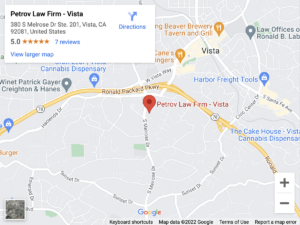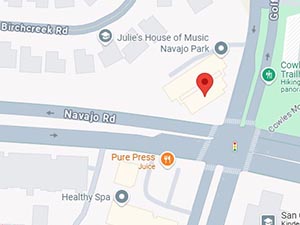
The short answer is yes, you can sue for emotional distress in Vista, California. Local courts apply California state law rather than Vista municipal law. There are three ways to sue for emotional distress in California. One of these ways requires you to have suffered a physical injury, and two of these ways do not.
Intentional Infliction of Emotional Distress

Intentional infliction of emotional distress is a civil offen
se in California. The legal elements of intentional infliction of emotional distress are:
- The defendant’s conduct was outrageous;
- The defendant acted with the intention of causing you emotional distress or with reckless disregard of the probability that you would suffer emotional distress;
- You actually suffered severe emotional distress; and
- The defendant’s conduct caused (or was a substantial factor in causing) your emotional distress.
The question of whether your emotional distress was severe enough to justify compensation is a question for the jury to decide.
Negligent Infliction of Emotional Distress
Negligent infliction of emotional distress occurs when someone suffers emotional harm due to the negligent (careless) behavior of another. In other words, unlike intentional infliction of emotional distress, the wrongdoer’s behavior does not have to be aimed at causing emotional distress.
Like intentional infliction of emotional distress, the victim need not suffer any physical injury to qualify for compensation-–emotional distress alone is enough.
The elements of a claim for negligent infliction of emotional distress are:
- The defendant owed you a duty of care. This duty of care often arises in, for example, a doctor-patient relationship, where one party trusts and depends on the other.
- The defendant breached their duty of care towards you;
- You suffered “severe” emotional distress; and
- The emotional distress you suffered was a consequence of the defendant’s negligent breach of duty.
California breaks negligent infliction of emotional distress into two separate theories of liability, as discussed below.
The Direct Victim Theory of Liability
The “direct victim” theory of liability applies when the person who suffered distress was the target of the offending behavior. California courts have specifically recognized the following situations in which you might file an emotional distress claim under the direct victim theory:
- Negligently abusing a corpse;
- The negligent misdiagnosis of a contagious disease.
Suppose, for example, that your doctor negligently diagnosed you with a contagious terminal disease even though you were perfectly healthy. Imagine your emotional distress as you began making funeral arrangements for yourself and worrying that you might have passed on the disease to a family member.
The Bystander Theory of Liability
As a bystander, you can file a claim for negligent infliction of emotional distress even though you were not the target of the defendant’s outrageous negligent behavior. You must prove:
- You witnessed the injury or death of someone else;
- You were a close relative of the victim;
- You were at the scene of the accident, and you were aware of what happened to the victim; and
- You suffered severe emotional distress as a result.
The bystander theory of liability might apply if, for example, a negligent driver hit and killed your loved one in your presence.
Non-Economic Damages in an Ordinary Personal Injury Lawsuit
In a personal injury lawsuit, damages for emotional distress are a form of non-economic damages. In a personal injury lawsuit, however, you must suffer a physical injury before you can qualify to receive compensation for emotional distress. This could mean, for example, a broken bone, but it could also mean clinically diagnosed depression or PTSD.
How Damages Work in a Personal Injury Lawsuit
In a normal personal injury lawsuit, you can demand three different types of compensation—economic damages, non-economic damages, and punitive damages.
- Economic damages include tangible losses such as medical expenses and lost earnings.
- Non-economic damages include pain and suffering, inconvenience, mental anguish, loss of companionship, loss of consortium, and humiliation. Most of these elements of compensation can be characterized as a form of emotional distress.
- Punitive damages represent an extra amount that a court will assess against a defendant whose conduct was outrageous. The purpose is not so much to compensate the victim as it is to punish the defendant. Courts rarely award punitive damages.
Defendants commonly agree to pay economic and non-economic damages as part of a negotiated settlement. Only rarely do they agree to pay punitive damages.
Breakdown of Damages
Following is a more detailed description of the various forms of compensation that a California court might award.
Pain and suffering
Pain and suffering damages compensate you for the anguish you suffer as a consequence of your physical injuries. Imagine what it’s like to feel the excruciating pain of a bone fracture, the near-panic of respiratory distress, or the claustrophobia of being immobilized in a hospital bed.
Mental anguish
Mental anguish includes fright, grief, shame, anger, or worry. You might be terrified during and after an accident, not knowing whether you will survive. If you suffered a catastrophic injury, you may experience the grief of knowing that life will never be the same again.
Loss of companionship, comfort, care, or society
If your close family member died in an accident, you might file a wrongful death lawsuit seeking damages. Loss of companionship from your deceased loved one is one of the forms of economic damages you can seek.
Loss of consortium
If your spouse or partner suffered an injury that deprived you of their love or their physical or emotional intimacy, you can file a loss of consortium claim seeking financial compensation for these losses.
Humiliation
Imagine the humiliation you might feel after suffering a disfiguring injury, having to spend time in the hospital in traction, or suffering invasive and painful medical procedures. You can receive compensation for these humiliations.
Yes, You Probably Need a Vista Personal Injury Lawyer
Calculating and proving the amount of compensation you deserve for emotional distress is not necessarily a straightforward matter. For precisely this reason, among others, you probably need a personal injury lawyer. Don’t worry; most Vista personal injury attorneys won’t charge you unless they win or settle your claim.
Schedule a Free Consultation With Our Vista Personal Injury Lawyers
Sustaining a personal injury can significantly impact your life. Contact Petrov Personal Injury Lawyers to schedule your free consultation with an experienced attorney or give a call at (619) 344-0360.


